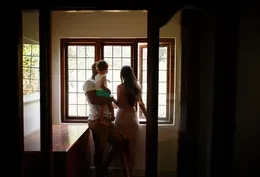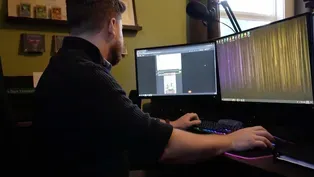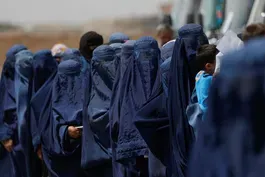
Hundreds of migrant children remain separated from families
Clip: 2/6/2023 | 5m 46sVideo has Closed Captions
Hundreds of migrant children remain separated from families despite push to reunite them
It’s been two years since the Biden administration took on the task of reunifying children with their families after they were separated at the southern border under the Trump administration’s zero-tolerance policy. While the Biden administration has succeeded in uniting some 600 children with their parents, about 1000 remain separated. Geoff Bennett spoke with Caitlin Dickerson about the process.
Problems with Closed Captions? Closed Captioning Feedback
Problems with Closed Captions? Closed Captioning Feedback
Major corporate funding for the PBS News Hour is provided by BDO, BNSF, Consumer Cellular, American Cruise Lines, and Raymond James. Funding for the PBS NewsHour Weekend is provided by...

Hundreds of migrant children remain separated from families
Clip: 2/6/2023 | 5m 46sVideo has Closed Captions
It’s been two years since the Biden administration took on the task of reunifying children with their families after they were separated at the southern border under the Trump administration’s zero-tolerance policy. While the Biden administration has succeeded in uniting some 600 children with their parents, about 1000 remain separated. Geoff Bennett spoke with Caitlin Dickerson about the process.
Problems with Closed Captions? Closed Captioning Feedback
How to Watch PBS News Hour
PBS News Hour is available to stream on pbs.org and the free PBS App, available on iPhone, Apple TV, Android TV, Android smartphones, Amazon Fire TV, Amazon Fire Tablet, Roku, Samsung Smart TV, and Vizio.
Providing Support for PBS.org
Learn Moreabout PBS online sponsorshipGEOFF BENNETT: It's been two years since the Biden administration took on the task of reconnecting children with their families after they were split up at the Southern border under the Trump administration's zero tolerance policy.
While the Biden White House has succeeded in uniting some 600 children with their parents, roughly 1,000 of them still remain separated.
Caitlin Dickerson has reported on this extensively for "The Atlantic," and joins us now.
Caitlin, thanks for being with us.
CAITLIN DICKERSON, "The Atlantic": Thank you for having me.
GEOFF BENNETT: So, the Trump administration's zero tolerance policy, we know from your reporting, separated more than 5,000 children from their parents with no process for reuniting them.
The roughly 1,000 children that still remain separated, what do we know about them?
How are they being cared for?
CAITLIN DICKERSON: So, the one thing that is true of all the children who have not been reunited yet with their parents is that they're no longer being housed in the government-overseen shelters where they were initially sent right after separation.
But that's really all they share in common.
The children who have not been reunited with their parents yet are scattered across the country.
Some are living with extended relatives.
Some are living with family friends who agreed to take them in.
And some have been taken into the care of state child welfare organizations and may be living in foster homes or adoptive homes.
And that's one of the challenges to reuniting these children with their parents is that they can be very hard to find.
GEOFF BENNETT: And, Caitlin, it seems the number of children who have yet to be reunited with their parents, it seems like that number is growing.
Why is that?
Are there more parents coming forward?
CAITLIN DICKERSON: That's right.
So, these numbers are a moving target.
And I actually wanted to clarify.
You initially mentioned about 1,000 children who have yet to be reunified.
That's the number we're hearing from the Biden administration.
But immigrant advocates would push back, because the Biden administration is only considering a subset of those total families who were separated under the Trump administration.
And that's the number from which they're pursuing their work.
That total number is about 3,900.
But, as you mentioned, actually, more than 5,000 families were separates.
Some of those were excluded from the federal court case that required these reunifications.
And so advocates argued that the total number of families who remain separated is actually much higher.
There's a second reason why this number is a moving target.
A Biden administration official said to me today: "Caitlin, we're still uncovering new separations and new horrors all the time."
So there are families who have come forward.
As part of the reunification process, they have applied for reunification and identified themselves as having been separated.
There was no record of the separation.
But the Biden administration was able to do a kind of forensic analysis of government records to ultimately determine, yes, this family was separated.
That's something that I focused on a lot in my reporting, is this often-nonexistent record keeping around family separations, and it's been corroborated again and again.
So that's why it's very difficult.
And, in fact, an administration official told me: "We will never get to the point where we have a total number of separated families, and, thus, nor will we ever get to a point where every single separated family has been reunited," which is a very stark and, of course, troubling reality.
GEOFF BENNETT: Well, tell me more about that.
What does this reunification process entail?
CAITLIN DICKERSON: So, there are advocacy organizations on the ground, mostly in Central America, actively looking for separated parents.
They're both trying to track down parents who haven't yet been contacted by the government and also to find, again, families who were identified maybe in the early months following the end of family separations, but who the government has lost track of since.
Once those families are identified, these advocacy groups tell them about the process to apply for unification and walk them through that process, along with the IOM, which the Biden administration has hired to help with this work.
IOM is an organization that does lots of refugee resettlement work.
It's often a months-long process to actually go through from start to finish, apply, and then be brought back into the United States.
And that's when then behavioral health services are offered, and just the beginning of that bond, the reformation of that bond starts.
But it's just something that is going to go on for a very long time and perhaps even forever.
GEOFF BENNETT: Lastly, Caitlin, there seems to be little to no appetite within the Biden White House to hold Trump administration officials responsible for this policy, even though President Biden himself said that this practice was criminal, this practice of separating kids from their parents at the border.
CAITLIN DICKERSON: You're right.
We have not seen any concrete evidence that there is such an appetite.
It doesn't mean that one won't come down the road, but they're certainly not talking about it now.
And there are policies being developed internally in the White House to try to and -- and in the Department of Homeland Security -- to try to prevent future family separations.
But as we all saw under the Trump administration, if those policies are not codified into law or regulation, they can go away on day one of a subsequent administration.
And so they're not necessarily as durable as a legal change or a concrete accountability for the individuals who came up with and who carried out the family separations to begin with.
GEOFF BENNETT: Caitlin Dickerson, staff writer for "The Atlantic," thanks so much for sharing your reporting with us.
CAITLIN DICKERSON: Thank you, Geoff.
Calls for paid leave grow 30 years after passage of FMLA
Video has Closed Captions
Clip: 2/6/2023 | 6m 28s | Calls for paid leave grow louder 30 years after passage of Family and Medical Leave Act (6m 28s)
Grammy Awards showcase music world and offer up surprises
Video has Closed Captions
Clip: 2/6/2023 | 5m 59s | Grammy Awards showcase music world and offer up surprises (5m 59s)
Online conspiracy theories led man to mental health crisis
Video has Closed Captions
Clip: 2/6/2023 | 4m 17s | Online conspiracy theories led man to mental health crisis (4m 17s)
Thousands dead in Turkey, Syria after powerful earthquake
Video has Closed Captions
Clip: 2/6/2023 | 8m 33s | Thousands dead in Turkey and Syria after 7.8 magnitude earthquake (8m 33s)
What China is trying to accomplish in U.S. airspace
Video has Closed Captions
Clip: 2/6/2023 | 7m 25s | What China is trying to accomplish with repeated incursions into U.S. airspace (7m 25s)
Women in Afghanistan find ways to make their voices heard
Video has Closed Captions
Clip: 2/6/2023 | 10m 52s | Women in Afghanistan find ways to make their voices heard under Taliban oppression (10m 52s)
Providing Support for PBS.org
Learn Moreabout PBS online sponsorshipSupport for PBS provided by:
Major corporate funding for the PBS News Hour is provided by BDO, BNSF, Consumer Cellular, American Cruise Lines, and Raymond James. Funding for the PBS NewsHour Weekend is provided by...
















